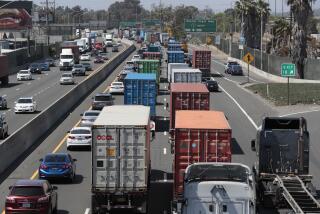Nepal Banning Noisy, Polluting Diesel Taxicabs in Capital
- Share via
KATMANDU, Nepal — The Nepalese government is striking its first blow against pollution, which has been blamed for a decline in tourism in the Himalayan kingdom.
Pressured by environmentalists and the tourism industry, officials have ordered noisy, diesel-powered, three-wheel taxis off the roads of the capital, Katmandu, beginning this month.
Environmentalists say the move was long overdue.
“The ban may not be the end to the pollution problems of Katmandu, but it is the beginning, and indeed a bold and good decision by the government,” said Amod Pokhrel at Leaders Nepal, an environmental group that is campaigning for improved air quality.
A recent study by Leaders Nepal said the pollution level in Katmandu was much higher than World Health Organization recommendations. In the busy parts of the city, dust particles were recorded at 1,290 micrograms per cubic meter, compared with WHO’s recommended maximum of 150 per cubic meter.
Taxi drivers argue the ban is unfair and misdirected.
“Why just us? We are just a small part of the pollution problem,” said Balram Gurung. “The government should have first banned industries and factories that emit harmful smoke and pollutants in the air.”
The predominantly blue three-wheel taxis that accommodate eight passengers have been a boon for commuters. But the smoke-belching vehicles have also been the target of angry protests and even vandalism by environmental activists.
The first of the Vikram Tempo vehicles were imported from neighboring India in 1988. Three years later, the government banned further imports and limited the number operating in the capital to about 1,200. Only 700 remain.
To encourage alternative transport, the government has announced it will forgo three-fourths of the import duty on minivans brought in to replace the three-wheel taxis. But taxi operators are demanding that the government waive all the duty.
“I have not even paid half of the loan on my three-wheeler, and now I have been ordered to get rid of it without even any compensation from the government,” said Bir Lama, who has been a taxi driver for two years. “I will not only be jobless but also in debt.”
A minivan that seats about 10 passengers costs the equivalent of about $11,000, compared to $3,600 for a diesel-powered three-wheeler.
The government also is waiving 99% of the duty on imported three-wheel vehicles powered by liquefied petroleum gas. But they are much more expensive--about $7,860--and have higher operating costs than the diesel taxis.
The government says the pollution reduction campaign won’t stop with the three-wheelers.
“After we clear out the Vikram Tempos, our next step will be to junk our government vehicles that are old and tested to be polluters,” Transport Minister Khum Bahadur Khadka said.
A crackdown on private vehicles will follow, he said.
Many commuters aren’t happy that the three-wheelers are doomed.
“It may be the biggest polluter, but it got us to work and back in time without having to sweat through crowded buses,” said Rupesh Joshi, a government official. “Now with the ban, there is no other reliable means of transport but to spend an extra hour every day on the bus.”
Buses make pickups at designated stops along established routes, whereas the three-wheelers have picked up passengers anywhere and taken them directly to wherever they wanted to go.
“For others it may be a blue monster, but for me it was a blue wonder,” said Akash Chetri, a college student.
More to Read
Sign up for Essential California
The most important California stories and recommendations in your inbox every morning.
You may occasionally receive promotional content from the Los Angeles Times.













